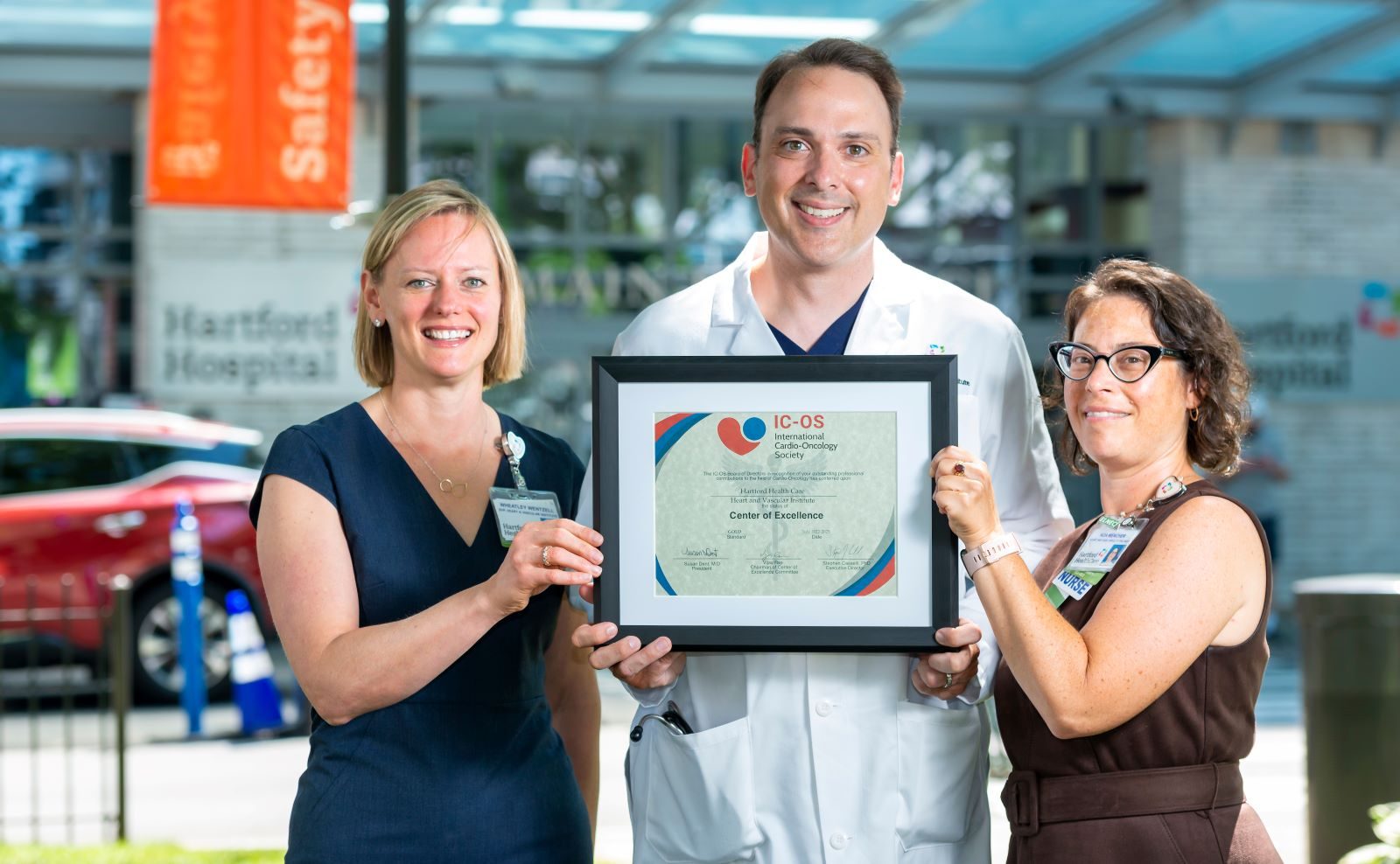<< Back
Cardio-Oncology Program Receives Gold Standard Certification

July 21, 2022
A mere five years after its launch, Hartford HealthCare’s Heart & Vascular Institute Cardio-Oncology Program has received a center of excellence certification from the International Cardio-Oncology Society (IC-OS) at the gold level, the highest award the organization can give.
The Hartford HealthCare Heart & Vascular Institute‘s Cardio-Oncology Program is a team of expert cardiologists working in partnership with oncologists to provide comprehensive cardiovascular care to cancer patients throughout their treatment phases. It officially launched in 2017.
The IC-OS Centers of Excellence Certification Gold Award is given to “a program within a healthcare institution which is assembled to supply an exceptionally high concentration of expertise and related resources centered on a particular area of medicine, delivering associated care in a comprehensive, interdisciplinary fashion to afford the best patient outcomes possible.”
Cardio-Oncology is a subspecialty that has evolved over the last 15 years as cancer treatments have become more advanced and complicated. Cardiovascular complications from cancer therapy have become a leading cause of morbidity and mortality for cancer survivors. This is due to a combination of direct cardiotoxicity and also the acceleration of new or preexisting cardiovascular disease, especially in the presence of traditional risk factors.
The Cardio-Oncology team treats patients at any stage of cancer therapy and beyond, providing comprehensive, coordinated and personalized care. Ensuring optimal cardiovascular health helps patients benefit from their life-saving cancer treatment.
Eric Oligino, MD, FACC, is a cardiologist with the Hartford HealthCare Heart & Vascular Institute who runs the Cardio-Oncology program. It was during the third year of his cardiology fellowship that he began working in a dedicated Cardio-Oncology clinic, and it sparked a deep interest in him.
“When I came to Hartford Hospital, I wanted to develop this type of program because I saw how much it benefited patients,” he said. “I collaborated with some of the oncologists and they were fully supportive of the idea, but since there was no infrastructure in place, I became a program of one. As I became more established and benefits of cardio-oncology expertise became apparent, we were able to launch a formal program.”
The key, Oligino said, is that the program doesn’t exist only at Hartford Hospital, requiring patients to travel from across the state. The program has cardio-oncologists from all HHC care centers across Connecticut, so patients can stay local and still receive the highest level of care.
“We want patients to have access to our program locally where they are receiving their cancer care, but benefit from the expertise across the statewide system,” he said.
Oncologist Wylie Hosmer, MD, said that patient care has reached new “levels of complexity given the number of new cancer treatments that we have. There are some classic cancer drugs that are associated with heart dysfunction, but there are also newer immuno-therapy treatments that have potential cardiac effects. It is a moving science and having this type of collaboration is the best way to keep our patients safe.”
“As an oncologist, this program gives me a high level of confidence that my patients are receiving state-of-the-art cardiac care,” Hosmer continued.
Hosmer said different factors can trigger a patient’s referral to the Cardio-Oncology program:
- A patient presents with new symptoms while undergoing cancer treatment.
- A drug with known potential toxicity to the heart is part of the treatment plan, and so the patient is entered into the program proactively for monitoring.
- During regular EKG monitoring, an abnormality appears.
- The patient completes cancer treatment without issue but receives post-cancer cardiology referral “to make sure they stay healthy for the remainder of their life.”
Cancer survivors make up a large part of the 450 or so patients who have gone through the program, Oligino said.
“We want them to enter the survivorship phase with their cardiac health optimized,” he said. Cancer patients can be underdiagnosed and undertreated for cardiac disease – we want to be proactive with that population.”